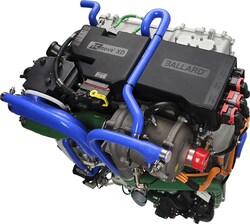Ballard launches FCmove-XD, fuel cell engine for heavy-duty trucks
B.C.-based Ballard Power Systems unveiled the FCmove-XD, its ninth generation, high-performance fuel cell engine.
It features an engine volumetric power density of 0.36 kW/L and gravimetric power density of 0.48 kW/kg, the company stated in a news release, adding that the scalable 120 kW fuel cell engine integrates DC/DC regulated output, enabling up to three modules to operate as one system with a single interface, capable of delivering a combined 360 kW of zero-emission power output.
Designed to exceed 30,000 hours of operation, which translates to over one million miles in truck usage under typical duty cycles, the FCmove-XD engine is engineered for exceptional durability and a low total cost of ownership.
Ballard plans to initially manufacture the FCmove-XD at its Oregon facility, with future high-volume manufacturing expected at Ballard Rockwall Giga 1, Ballard’s Gigafactory facility planned to be built in Rockwall, Texas.
“The power and performance requirements of the highly-segmented truck market are particularly demanding due to various use cases, including high vehicle utilization rates and payload requirements,” said Silvano Pozzi, Ballard’s vice-president of product line management. “One of the compelling features of our new FCmove-XD is scalability based on modularity. We can offer customers efficient integration of 120 kW, 240 kW, and 360 kW solutions dependent on truck class, use case, and duty cycle. For example, two engines, totaling 240 kW of power output, can be easily installed in the engine compartment of a typical Class 8 heavy-duty truck, enhancing standardization and redundancy.”
The FCmove-XD marks an upgrade from previous models, featuring a 120 kW output through an advanced single stack and a 33% reduction in parts count for increased reliability and cost-efficiency, Ballard said in a release. With a system efficiency of over 60%, it supports lower fuel consumption and has an expansive operating temperature of up to 95°C. Integration of a power controller streamlines engine operation and maintenance with a more than 50% reduction in assembly time.

Have your say
This is a moderated forum. Comments will no longer be published unless they are accompanied by a first and last name and a verifiable email address. (Today's Trucking will not publish or share the email address.) Profane language and content deemed to be libelous, racist, or threatening in nature will not be published under any circumstances.